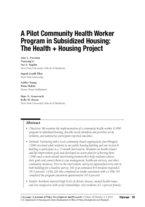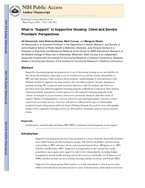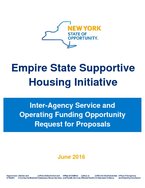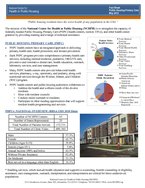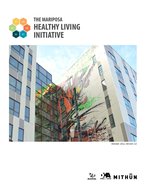0
Case study
Community:
Oct 31, 2018
To encourage architects and planners to design built environments that promote physical activity, New York City offers an “active design” building incentive within the Leadership in Energy and Environmental Design (LEED) standards. The Centers for Disease Control and Prevention (CDC) recommends that adults ages 18 to 65 engage in 150 minutes of moderate-intensity physical activity (MPA) or 75 minutes of vigorous physical activity (VPA) per week to reduce risk of disease and promote a healthy lifestyle, but in 2011, only 20 percent of Americans met these goals. Active design interventions provide an easy way for residents to increase their activity and meet these goals. This study analyzed the impact of the new design incentive on the activity levels of affordable housing residents at the Arbor House, a 124-unit development in the South Bronx that received the LEED credit.
Authored by: How Housing Matters, Preventative Medicine Reports
Topics: East Coast, Exercise, Health, Housing, Low-income, Place-based, Preventative care, Research
 Shared by Mica O'Brien
Shared by Mica O'Brien
Mica O'Brien posted a
on Nov 1, 2018
How Housing Matters, Preventative Medicine Reports
To encourage architects and planners to design built environments that promote physical activity, New York City offers an “active design” building incentive within the Leadership in Energy and Environmental Design (LEED) standards.
0
News Article
Community:
Sep 24, 2018
The Housing Authority of the County of Los Angeles (Calif.) developed an innovative community garden to provide access to affordable and fresh food as well as skills training and job opportunities.
Authored by: Ashanti Wright for Journal of Housing & Community Development
Topics: Community development, Food insecurity, Green, Health, Housing, Low-income, Nutrition, Place-based, Sustainability, Youth
 Shared by Mica O'Brien
Shared by Mica O'Brien
Mica O'Brien posted a
on Oct 30, 2018
Ashanti Wright for Journal of Housing & Community Development
The Housing Authority of the County of Los Angeles (Calif.) developed an innovative community garden to provide access to affordable and fresh food as well as skills training and job opportunities.
0
Research
Community:
Oct 29, 2018
We examine the implementation of a community health worker (CHW) program in subsidized housing, describe needs identified and priorities set by residents, and summarize participant-reported outcomes.
Authored by: New York University School of Medicine, New York University, Henry Street Settlement, New York University School of Medicine
Topics: East Coast, Health, Housing, Low-income, Partnerships, Place-based, Research
 Shared by Mica O'Brien
Shared by Mica O'Brien
Mica O'Brien posted a
on Oct 29, 2018
New York University School of Medicine, New York University, Henry Street Settlement, New York University School of Medicine
We examine the implementation of a community health worker (CHW) program in subsidized housing, describe needs identified and priorities set by residents, and summarize participant-reported outcomes.
0
Publication
Community:
Jan 1, 2018
More than 50 years after the passage of the Fair Housing Act, what would it take to meaningfully reduce residential segregation and/or to mitigate its negative consequences in the United States? In this volume, leading academics, practitioners, and policymakers grapple with this question, examining different aspects of the complex and deeply rooted problem of residential segregation and proposing concrete steps that could achieve meaningful change withing the next ten to fifteen years.
Authored by: Joint Center for Housing Studies of Harvard University
Topics: Community development, Legislation & Policy, Mobility, Place-based, Racial inequalities, Research
 Shared by Mica O'Brien
Shared by Mica O'Brien
Mica O'Brien posted a
on Oct 25, 2018
Joint Center for Housing Studies of Harvard University
More than 50 years after the passage of the Fair Housing Act, what would it take to meaningfully reduce residential segregation and/or to mitigate its negative consequences in the United States?
0
Interactive
Community:
Oct 24, 2018
The Opportunity Zone Fund Directory is a list of current Opportunity Zone funding opportunities compiled by the National Coalition of State Housing Agencies staff. This resource provides descriptions and contact information for publicly-announced funds that have been formed for the purpose of attracting investment in Opportunity Zones.
Authored by: National Coalition of State Housing Agencies
Topics: Community development, Legislation & Policy, Place-based
 Shared by Mica O'Brien
Shared by Mica O'Brien
Mica O'Brien posted a
on Oct 25, 2018
National Coalition of State Housing Agencies
The Opportunity Zone Fund Directory is a list of current Opportunity Zone funding opportunities compiled by the National Coalition of State Housing Agencies staff.
0
Report
Community:
Oct 24, 2018
CLPHA’s Housing Is Initiative is engaged in a number of cross-sector activities focused on developing partnerships, facilitating a community of practice, resource development, promoting best practices, online collaboration, policy and advocacy, and training and education. Read about recent activities in this Fall Update.
Authored by:
Topics: Child welfare, CLPHA, Community development, Cost effectiveness, Data sharing, Early childhood, Education, Family engagement, Funding, Health, Homelessness, Housing, Low-income, Medicaid / Medicare, Mental health, Partnerships, Place-based, Post-secondary, Research, Stability, Substance abuse, Workforce development, Youth
 Shared by Mica O'Brien
Shared by Mica O'Brien
Mica O'Brien posted a
on Oct 24, 2018
CLPHA’s Housing Is Initiative is engaged in a number of cross-sector activities focused on developing partnerships, facilitating a community of practice, resource development, promoting best practices, online collaboration, policy and advocacy, and training and education.
0
News Article
Community:
Oct 9, 2018
Sweet Water Foundation transformed four blocks in Englewood to cultivate community and help build skills, resources, and opportunities for residents.
Authored by: MacArthur Foundation
Topics: Community development, Family engagement, Food insecurity, Green, Health, Low-income, Midwest, Nutrition, Partnerships, Place-based, Sustainability, Youth
 Shared by Mica O'Brien
Shared by Mica O'Brien
Mica O'Brien posted a
on Oct 24, 2018
Sweet Water Foundation transformed four blocks in Englewood to cultivate community and help build skills, resources, and opportunities for residents.
0
Webinar
Community:
Aug 29, 2018
Half of public housing authorities (PHAs) are engaged in at least one health initiative, almost all in partnership with the health sector, according to a new report by the Council of Large Public Housing Authorities (CLPHA) and the Public and Affordable Housing Research Corporation (PAHRC).Health Starts at Home: A National Snapshot of Public Housing Authorities' Health Partnerships finds that PHAs are key players in addressing the intersection of housing and health and that deepening partnerships between PHAs and health providers can better serve residents' and communities’ health needs.
Stephen Lucas (CLPHA), Keely Stater (PAHRC), and Kelly McElwain (PAHRC) discuss health initiatives taking place at PHAs across the country and strategies for better serving communities with cross-sector partnerships.
Authored by: CLPHA
Topics: CLPHA, Dual-eligibles, Health, Housing, Low-income, Medicaid / Medicare, Mental health, Nutrition, Partnerships, Place-based, Preventative care, Research, Seniors
 Shared by Housing Is
Shared by Housing Is
Housing Is posted a
on Oct 11, 2018
Half of public housing authorities (PHAs) are engaged in at least one health initiative, almost all in partnership with the health sector, according to a new report by the Council of Large Public Housing Authorities (CLPHA) and the Public and Affordable Housing Research Corporation (PAHRC).Health St
0
Webinar
Community:
Oct 9, 2018
CLPHA’s Education Working Group hosts a webinar with Bright by Text, a texting platform that connects caregivers with tools for improving educational outcomes for children. Bright by Text’s President and Senior Program Manager share information about their partnerships with housing authorities and non-profit housing providers across the country, providing insight into the benefits of connecting with residents through technology. CLPHA members who work with Bright by Text outline their respective initiatives and discussed local program goals.
Authored by: CLPHA
Topics: Child welfare, CLPHA, Dual-generation, Early childhood, Family engagement, Health, Home visiting, Housing, Housing Is Working Group, Partnerships, Place-based, Preventative care, Safety, School-readiness
 Shared by Mica O'Brien
Shared by Mica O'Brien
Mica O'Brien posted a
on Oct 10, 2018
CLPHA’s Education Working Group hosts a webinar with Bright by Text, a texting platform that connects caregivers with tools for improving educational outcomes for children.
0
Case study
Community:
Sep 25, 2018
Practitioners working on community safety have increasingly incorporated creative placemaking techniques into their work. Creative placemaking refers to the ways in which arts and culture change how people use the places they share.
Authored by: Mark Treskon for Urban Institute
Topics: Community development, Criminal justice, Low-income, Out-of-school time, Partnerships, Place-based
 Shared by Mica O'Brien
Shared by Mica O'Brien
Mica O'Brien posted a
on Oct 10, 2018
Mark Treskon for Urban Institute
Practitioners working on community safety have increasingly incorporated creative placemaking techniques into their work. Creative placemaking refers to the ways in which arts and culture change how people use the places they share.
0
News Article
Community:
Oct 8, 2018
A strategy for community problem-solving does an extraordinary job at restoring our social fabric.
Authored by: David Brooks for The New York Times
Topics: Community development, Education, Partnerships, Place-based, Youth
 Shared by Mica O'Brien
Shared by Mica O'Brien
Mica O'Brien posted a
on Oct 10, 2018
David Brooks for The New York Times
A strategy for community problem-solving does an extraordinary job at restoring our social fabric.
0
Research
Community:
Oct 1, 2018
Although the rental assistance programs varied, key themes emerged, including (1) most programs, recognizing the impact of housing stability on health outcomes, targeted populations served by state or local health and human services programs; (2) most programs served a growing number of households over time; (3) funding generally increased over time and most of it came from general revenue; and (4) programs involved collaboration between the housing and health and human services agencies to ensure clients’ needs were comprehensively met.
Authored by: Anna Bailey, Peggy Bailey, and Douglas Rice for the Center on Budget and Policy Priorities
Topics: Funding, Health, Housing, Legislation & Policy, Low-income, Partnerships, Place-based, Research, Stability
 Shared by Mica O'Brien
Shared by Mica O'Brien
Mica O'Brien posted a
on Oct 9, 2018
Anna Bailey, Peggy Bailey, and Douglas Rice for the Center on Budget and Policy Priorities
Although the rental assistance programs varied, key themes emerged, including (1) most programs, recognizing the impact of housing stability on health outcomes, targeted populations served by state or local health and human services programs; (2) most programs served a growing number of households o
0
Webinar
Community:
Sep 26, 2018
The Colorado Coalition for the Homeless (CCH) has been investing in supportive housing since 1990. Since that time, this comprehensive community health center has developed nearly 1,700 units of housing, and is one of the country’s leaders in integrating health care and housing for a vulnerable population.
This webinar discusses how CCH finances its capital development; how they plan, design, and manage multiple projects simultaneously; how they integrate housing and health care services; and how they include property management staff in a coordinated approach to care. This conversation with members of CCH’s leadership complements our recent policy brief and included time for audience Q&A.
Authored by: National Health Care for the Homeless Council
Topics: Health, Homelessness, Low-income, Medicaid / Medicare, Mental health, Pacific Northwest, Place-based, Supportive housing
 Shared by Mica O'Brien
Shared by Mica O'Brien
Mica O'Brien posted a
on Oct 9, 2018
National Health Care for the Homeless Council
The Colorado Coalition for the Homeless (CCH) has been investing in supportive housing since 1990.
0
News Article
Community:
Oct 5, 2018
At a recent symposium convened by Capital One in Plano, Texas, practitioners, researchers, funders, business leaders, technologists, and other stakeholders discussed ways local leaders can harness technology and data to increase access to opportunity. This issue is particularly relevant in the Dallas metropolitan area, which is one of the country’s fastest-growing tech hubs yet still struggles with a lack of economic and racial inclusion.
Authored by: Aaron Shroyer, Solomon Greene, and Emily Peiffer for Urban Institute
Topics: Broadband, Low-income, Place-based
 Shared by Mica O'Brien
Shared by Mica O'Brien
Mica O'Brien posted a
on Oct 5, 2018
Aaron Shroyer, Solomon Greene, and Emily Peiffer for Urban Institute
At a recent symposium convened by Capital One in Plano, Texas, practitioners, researchers, funders, business leaders, technologists, and other stakeholders discussed ways local leaders can harness technology and data to increase access to opportunity.
0
Case study
Community:
Jun 25, 2018
The King County Housing Authority (KCHA), in partnership with the Highline School District and the nonprofit social service organization Neighborhood House, launched the Student and Family Stability Initiative (SFSI) pilot program in 2013 to provide housing and employment supports to homeless and unstably housed families with children enrolled in Highline elementary schools. In 2016, KCHA contracted with the Urban Institute (Urban) to conduct a process and outcome evaluation of the program’s first three pilot years. This evaluation documents how SFSI works, who it serves, and how well it helps participants achieve housing stability. This report synthesizes findings from data collection conducted over approximately 10 months that included document review, interviews with SFSI stakeholders, and analysis of program and other relevant KCHA administrative data.
Authored by: Martha M. Galvez, Amanda Gold, and Sara McTarnaghan
Topics: Attendance, Dual-generation, Education, Family engagement, Housing, Low-income, Pacific Northwest, Partnerships, Place-based, Research, Stability, Workforce development, Youth
 Shared by Mica O'Brien
Shared by Mica O'Brien
Mica O'Brien posted a
on Sep 18, 2018
Martha M. Galvez, Amanda Gold, and Sara McTarnaghan
The King County Housing Authority (KCHA), in partnership with the Highline School District and the nonprofit social service organization Neighborhood House, launched the Student and Family Stability Initiative (SFSI) pilot program in 2013 to provide housing and employment supports to homeless and un
0
Policy Brief
Community:
Aug 9, 2018
Everyone needs safe, decent, stable housing. For some of the most vulnerable people in America — people with mental illness, chronic health conditions, histories of trauma, and other struggles — a home helps them to get adequate treatment and start on the path toward recovery. But some conditions make it difficult for people to maintain a stable home without additional help. Supportive housing, a highly effective strategy that combines affordable housing with intensive coordinated services, can provide that needed assistance.
Authored by:
Topics: Cost effectiveness, Disabilities, Health, Homelessness, Housing, Low-income, Medicaid / Medicare, Mental health, Place-based, Seniors, Supportive housing
 Shared by Housing Is
Shared by Housing Is
Housing Is posted a
on Aug 9, 2018
Everyone needs safe, decent, stable housing. For some of the most vulnerable people in America — people with mental illness, chronic health conditions, histories of trauma, and other struggles — a home helps them to get adequate treatment and start on the path toward recovery.
0
Policy Brief
Community:
Aug 9, 2018
Social determinants of health are the economic and social conditions that affect health outcomes and are the underlying, contributing factors of health inequities. Examples include housing, educational attainment, employment and the environment.
Authored by:
Topics: Affordable Care Act, Disabilities, Health, Homelessness, Housing, Low-income, Medicaid / Medicare, Mental health, Partnerships, Place-based, Substance abuse, Supportive housing
 Shared by Housing Is
Shared by Housing Is
Housing Is posted a
on Aug 9, 2018
Social determinants of health are the economic and social conditions that affect health outcomes and are the underlying, contributing factors of health inequities. Examples include housing, educational attainment, employment and the environment.
0
Research
Community:
Aug 1, 2018
We examine the implementation of a community health worker (CHW)
program in subsidized housing, describe needs identified and priorities set by residents, and summarize participant-reported outcomes.
Authored by:
Topics: East Coast, Health, Housing, Low-income, Mental health, Metrics, Partnerships, Place-based, Racial inequalities, Research
 Shared by Housing Is
Shared by Housing Is
Housing Is posted a
on Aug 1, 2018
We examine the implementation of a community health worker (CHW)
program in subsidized housing, describe needs identified and priorities set by residents, and summarize participant-reported outcomes.
0
Report
Community:
Jul 27, 2018
This report aims to provide the Robert Wood Johnson Foundation (RWJF) and other health foundations with a perspective on the emerging intersection of social determinants of health (SDOH), health care systems, and social and other services. These fields intersect in how and what data are collected, and in ways the data are used to improve health and well-being and promote a Culture of Health.
Authored by:
Topics: Data sharing, Funding, Health, Medicaid / Medicare, Metrics, Nutrition, Partnerships, Place-based, Research
 Shared by Housing Is
Shared by Housing Is
Housing Is posted a
on Jul 27, 2018
This report aims to provide the Robert Wood Johnson Foundation (RWJF) and other health foundations with a perspective on the emerging intersection of social determinants of health (SDOH), health care systems, and social and other services.
0
Research
Community:
Jul 23, 2018
Supportive housing programs are proposed as a way of increasing housing access and stability for the chronically homeless, improving access to needed services, and decreasing vulnerability to HIV and other diseases. Little is known about residents’ understandings of and experiences with different models of supportive housing and how they fit within residents’ broader strategies to maintain housing. We conducted semi-structured interviews with 23 residents and 10 service providers from nine different supportive housing programs in Hartford, Connecticut. Data analysis explored residents’ perceptions of and experiences with supportive housing programs in the context of strategies to access resources and receive emotional, financial, and other forms of support.
Authored by:
Topics: East Coast, Homelessness, Housing, Mental health, Place-based, Research, Substance abuse, Supportive housing
 Shared by Housing Is
Shared by Housing Is
Housing Is posted a
on Jul 23, 2018
Supportive housing programs are proposed as a way of increasing housing access and stability for the chronically homeless, improving access to needed services, and decreasing vulnerability to HIV and other diseases.
0
Case study
Community:
Jul 23, 2018
Time and again, taking a narrow view of health care has proven ineffective in producing meaningful change. Yet the current
thrust of health care reform remains firmly focused on traditional health care services. Reforms such as care coordination models and patient centered medical homes are necessary but insufficient for homeless populations with complex problems. Pairing such reforms with supportive housing is more likely to result in lasting health improvements and reduced costs.
Authored by:
Topics: Cost effectiveness, East Coast, Health, Homelessness, Housing, Legislation & Policy, Medicaid / Medicare, Place-based, Supportive housing
 Shared by Housing Is
Shared by Housing Is
Housing Is posted a
on Jul 23, 2018
Time and again, taking a narrow view of health care has proven ineffective in producing meaningful change. Yet the current
thrust of health care reform remains firmly focused on traditional health care services.
0
Policy Brief
Community:
Jul 23, 2018
Public Housing Primary Care (PHPC) health centers have an integrated approach to delivering primary health care, health promotion, and disease prevention. PHPC health centers work closely with public housing authorities to address the health and wellness needs of the diverse residents.
Authored by:
Topics: Funding, Health, Housing, Low-income, Mental health, Partnerships, Place-based
 Shared by Housing Is
Shared by Housing Is
Housing Is posted a
on Jul 23, 2018
Public Housing Primary Care (PHPC) health centers have an integrated approach to delivering primary health care, health promotion, and disease prevention. PHPC health centers work closely with public housing authorities to address the health and wellness needs of the diverse residents.
0
Interactive
Community:
Jul 20, 2018
Kaiser Permanente NW Community Benefit intends to award at least $1.5 million in community grants to support organizations that help people with behavioral health challenges to secure and maintain safe, stable housing. A minimum of five grants of up to $325,000 will be awarded for projects lasting 3 ½ years. Projects must include the involvement of peers or community health workers (CHWs) and must involve collaboration between housing providers, health care providers (including behavioral health service providers) and those community organizations employing peers or CHWs.
Authored by:
Topics: Funding, Health, Homelessness, Housing, Mental health, Pacific Northwest, Partnerships, Place-based, Preventative care, Substance abuse
 Shared by Housing Is
Shared by Housing Is
Housing Is posted a
on Jul 20, 2018
Kaiser Permanente NW Community Benefit intends to award at least $1.5 million in community grants to support organizations that help people with behavioral health challenges to secure and maintain safe, stable housing.
0
Research
Community:
Jul 19, 2018
The link between federal housing policy and public health has been understood since the nineteenth century, when housing activists first sought to abolish slums and create healthful environments. This article describes how the Obama administration—building on these efforts and those that followed, including the Great Society programs of President Lyndon Johnson—has adopted a cross-sector approach that takes health considerations into account when formulating housing and community development policy. The federal Department of Housing and Urban Development fully embraces this “health in all policies” approach. Nonetheless, the administration’s strategy faces challenges, including fiscal and political ones. Some of these challenges may be overcome by conducting quality research on how housing and community development policies affect health outcomes, and by developing a federal budget strategy that takes into account how investments in one sector contribute to cost savings in another.
Authored by:
Topics: Affordable Care Act, Community development, Disabilities, Health, Healthy homes, Housing, Legislation & Policy, Low-income, Mobility, Partnerships, Place-based, RAD, Research
 Shared by Housing Is
Shared by Housing Is
Housing Is posted a
on Jul 19, 2018
The link between federal housing policy and public health has been understood since the nineteenth century, when housing activists first sought to abolish slums and create healthful environments.
0
Case study
Community:
Jul 17, 2018
The Mariposa Healthy Living Initiative began in 2009, when the Denver Housing Authority and its master planning team established physical, mental, and community health as a proxy to understand how redevelopment actions would change the quality of life for residents. The Initiative recognizes that the built environment is a determinant of health outcomes, which ultimately influence the quality and length of life for residents. The Initiative uses a responsive and rigorous approach to address environmental and social determinants of health, which include Healthy Housing, Environmental Stewardship, Sustainable and Safe Transportation, Social Cohesion, Public Infrastructure, and Healthy Economy. The Initiative framework is intended to be a living implementation tool for designers, developers, and practitioners.
Authored by:
Topics: Housing, Low-income, Partnerships, Place-based, Preventative care, Research, Safety, Transportation, West Coast
 Shared by Housing Is
Shared by Housing Is
Housing Is posted a
on Jul 17, 2018
The Mariposa Healthy Living Initiative began in 2009, when the Denver Housing Authority and its master planning team established physical, mental, and community health as a proxy to understand how redevelopment actions would change the quality of life for residents.
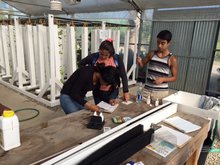



 Shared by Housing Is
on Oct 11, 2018
Shared by Housing Is
on Oct 11, 2018


 Shared by Housing Is
on Aug 9, 2018
Shared by Housing Is
on Aug 9, 2018
 Shared by Housing Is
on Aug 9, 2018
Shared by Housing Is
on Aug 9, 2018
 Shared by Housing Is
on Aug 1, 2018
Shared by Housing Is
on Aug 1, 2018
 Shared by Housing Is
on Jul 27, 2018
Shared by Housing Is
on Jul 27, 2018
 Shared by Housing Is
on Jul 23, 2018
Shared by Housing Is
on Jul 23, 2018
 Shared by Housing Is
on Jul 23, 2018
Shared by Housing Is
on Jul 23, 2018
 Shared by Housing Is
on Jul 23, 2018
Shared by Housing Is
on Jul 23, 2018
 Shared by Housing Is
on Jul 20, 2018
Shared by Housing Is
on Jul 20, 2018
 Shared by Housing Is
on Jul 19, 2018
Shared by Housing Is
on Jul 19, 2018
 Shared by Housing Is
on Jul 17, 2018
Shared by Housing Is
on Jul 17, 2018







